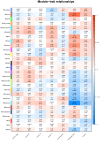Identification of key genes and pathways associated with esophageal squamous cell carcinoma development based on weighted gene correlation network analysis
- PMID: 32047546
- PMCID: PMC6995384
- DOI: 10.7150/jca.30699
Identification of key genes and pathways associated with esophageal squamous cell carcinoma development based on weighted gene correlation network analysis
Abstract
Background: As one of the most aggressive malignancies, esophageal squamous cell carcinoma(ESCC) remains one of the leading causes of cancer related death worldwide. The majority of ESCCs are diagnosed at advanced stages with poor five-year survival rate, making it urgent to identify specific genes and pathways associated with its initiation and prognosis. Materials and Methods: The differentially expressed genes in TCGA were analysed to construct a co-expression network by WGCNA. Gene ontology (GO) terms and Kyoto Encyclopedia of Genes and Genomes (KEGG) pathways analysis were performed for the selected genes. Module-clinical trait relationships were analyzed to explore the genes and pathways that associated with clinicopathological parameters of ESCC. Log-rank tests and COX regression were used to identify the prognosis-related genes. Results: The brown module containing 716 genes which most significantly contributed to ESCC. GO analysis suggested enrichment of adaptive immune response, cyclin-dependent protein serine, regeneration and mRNA metabolic process. KEGG analysis indicated pathways including Cellular senescence, Ribosome biogenesis, Proteasome, Base excision repair and p53 signaling pathway. Clinical stage was associated with cyan module; clinical M was associated with grey60 module; clinical T was associated with darkturquoise module; while clinical N, histological type and cancer location were associated with turquoise module. Key genes of TCP1, COQ3, PTMA and MAPRE1 might be potential prognostic markers for ESCC. Discussion: Differentially expressed genes and key modules contributing to initiation and progression in ESCC were identified by WGCNA. These findings provide novel insights into the mechanisms underlying the initiation, prognosis and treatment of ESCC.
Keywords: esophageal squamous cell carcinoma; prognosis.; risk; weighted gene correlation network analysis.
© The author(s).
Conflict of interest statement
Competing Interests: The authors have declared that no competing interest exists.
Figures





Similar articles
-
Identification of key genes and pathways associated with cholangiocarcinoma development based on weighted gene correlation network analysis.PeerJ. 2019 Oct 31;7:e7968. doi: 10.7717/peerj.7968. eCollection 2019. PeerJ. 2019. PMID: 31687280 Free PMC article.
-
Identification of key genes associated with esophageal adenocarcinoma based on bioinformatics analysis.Ann Transl Med. 2021 Dec;9(23):1711. doi: 10.21037/atm-21-4015. Ann Transl Med. 2021. PMID: 35071405 Free PMC article.
-
Development of a prognostic nomogram based on an eight-gene signature for esophageal squamous cell carcinoma by weighted gene co-expression network analysis (WGCNA).Ann Transl Med. 2022 Jan;10(2):88. doi: 10.21037/atm-21-6935. Ann Transl Med. 2022. PMID: 35282133 Free PMC article.
-
LncRNA and mRNA integration network reconstruction reveals novel key regulators in esophageal squamous-cell carcinoma.Genomics. 2019 Jan;111(1):76-89. doi: 10.1016/j.ygeno.2018.01.003. Epub 2018 Jan 6. Genomics. 2019. PMID: 29317304
-
miR-92b-3p Functions As A Key Gene In Esophageal Squamous Cell Cancer As Determined By Co-Expression Analysis.Onco Targets Ther. 2019 Oct 14;12:8339-8353. doi: 10.2147/OTT.S220823. eCollection 2019. Onco Targets Ther. 2019. PMID: 31686859 Free PMC article.
Cited by
-
Upregulation of Centromere Proteins as Potential Biomarkers for Esophageal Squamous Cell Carcinoma Diagnosis and Prognosis.Biomed Res Int. 2022 Apr 20;2022:3758731. doi: 10.1155/2022/3758731. eCollection 2022. Biomed Res Int. 2022. PMID: 35496042 Free PMC article.
-
Predicting and Understanding the Pathology of Single Nucleotide Variants in Human COQ Genes.Antioxidants (Basel). 2022 Nov 22;11(12):2308. doi: 10.3390/antiox11122308. Antioxidants (Basel). 2022. PMID: 36552517 Free PMC article.
-
Analysis of Differentially Expressed Genes in a Chinese Cohort of Esophageal Squamous Cell Carcinoma.J Cancer. 2020 Apr 6;11(13):3783-3793. doi: 10.7150/jca.40850. eCollection 2020. J Cancer. 2020. PMID: 32328183 Free PMC article.
-
Levels of Coenzyme Q10 and Several COQ Proteins in Human Astrocytoma Tissues Are Inversely Correlated with Malignancy.Biomolecules. 2022 Feb 20;12(2):336. doi: 10.3390/biom12020336. Biomolecules. 2022. PMID: 35204836 Free PMC article.
-
TCP1 expression alters the ferroptosis sensitivity of diffuse large B-cell lymphoma subtypes by stabilising ACSL4 and influences patient prognosis.Cell Death Dis. 2024 Aug 22;15(8):611. doi: 10.1038/s41419-024-07001-0. Cell Death Dis. 2024. PMID: 39174525 Free PMC article.
References
-
- Siegel RL, Miller KD, Jemal A. Cancer statistics, 2016. CA: a cancer journal for clinicians. 2016;66(1):7–30. - PubMed
-
- Enzinger PC, Mayer RJ. Esophageal cancer. The New England journal of medicine. 2003;349(23):2241–2252. - PubMed
-
- Siewert JR, Ott K. Are squamous and adenocarcinomas of the esophagus the same disease? Seminars in radiation oncology. 2007;17(1):38–44. - PubMed
LinkOut - more resources
Full Text Sources
Research Materials
Miscellaneous

